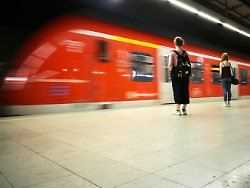Tuesday, October 5th, 2021
Too few buses and trains
Cities are missing billions for traffic turnaround
If the Germans are to switch to local public transport, it has to be expanded. So far, there is not enough money available for this, complain local authorities. They are demanding an additional 11 billion euros from the future federal government for transport projects.
For a real turnaround in mobility, local public transport in Germany will need 1.5 billion euros per year from 2022 onwards than previously estimated by the federal government. This is what the umbrella association of municipalities in Germany, the German Association of Towns and Municipalities (DStGB), called for in Neustrelitz with a view to exploring the federal parties in Berlin.
The money – around eleven billion euros by 2030 – is necessary to cover the additional needs as a result of climate protection and to offer drivers incentives to switch to local transport, said the chairman of the Federal Committee for Economics, Transport and Tourism, Ingo Hacker, after consulting with mayors . “A strong public transport is the core element of a traffic turnaround.” If carbon dioxide levels in the transport sector are to be reduced by 88 percent by 2040, you need a mix of attractive local transport, expanded rail lines, more bike paths and e-vehicles, added Timm Fuchs from the umbrella organization.
Rural regions in particular need to be better connected through flexible bus services such as on-call bus systems. A new federal government should also start a traffic offensive for cyclists and pedestrians. Old railway lines should also be reactivated. That is possible over a distance of about 1300 kilometers. The current passenger numbers should not be taken as a yardstick here, but the passenger potential that can be achieved with an attractive expansion.
As important positive examples, Hacker cited an S-Bahn extension in the greater Stuttgart area, which should cost 220 million euros, as well as the reactivation of railway lines such as Neustrelitz-Mirow or the Mecklenburg Southern Railway, whose continued operation had been disputed for years. The organization represents the interests of municipalities in Germany through 17 regional associations. Previously, the consumer advice centers and the transport ministers of the federal states had also asked for more money for the transport sector and more flexible transport offers in rural areas for the mobility transition.
